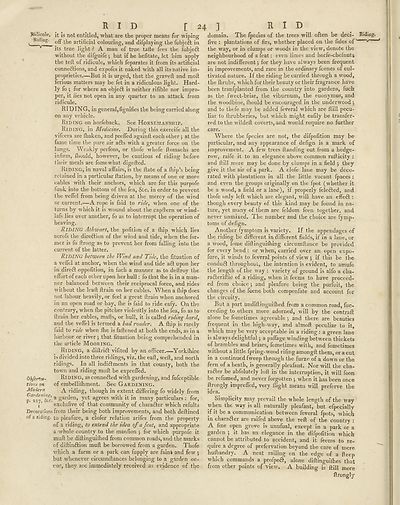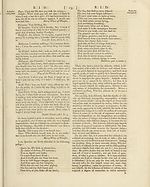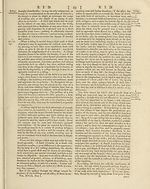Encyclopaedia Britannica, or, a Dictionary of arts, sciences, and miscellaneous literature : enlarged and improved. Illustrated with nearly six hundred engravings > Volume 18, RHI-SCR
(30) Page 24
Download files
Complete book:
Individual page:
Thumbnail gallery: Grid view | List view

R I D
[ 24
Rtclicule, Jt is not entitled, what are the proper means for wiping
, off the artificial colouring, and difplaying the fubjeft in
its true light ? A man of true tafte fees the iubjedt
without the difguife j but if he hefitate, let him apply
the teft of ridicule, which feparates it from its artificial
connexions, and expofes it naked with all its native im¬
proprieties.—But it is urged, that the graveft and moll
ferious matters may be fet in a ridiculous light. Hard¬
ly fo ; for where an objeX is neither rifible nor impro¬
per, it lies not open in any quarter to an attack from
ridicule.
RIDING, in general, fignifies the being carried along
on any vehicle.
Riding on horfeback. See Horsemanship.
Riding, in Medicine. During this exercife all the
vifeera are fhaken, and preffed againft each other ; at the
fame time the pure air aXs with a greater force on the
lungs. Weakly perfons, or thofe whofe ftomachs are
infirm, fliould, however, be cautious of riding before
their meals are fomewhat digefted.
Riding, in naval affairs, is the Rate of a {hip’s being
retained in a particular Ration, by means of one or more
cables with their anchors, which are for this purpofe
funk into the bottom of the fea, &c. in order to prevent
the veffel from being driven at the mercy of the wind
or current.—A rope is faid to r/V/e, Avhen one of the
turns by which it is wound about the capflern or wind-
lafs lies over another, fo as to interrupt the operation of
heaving.
RIDING Athwart, the pofition of a (hip which lies
acrofs the diredfion of the wind and tide, when the for¬
mer is fo Rrong as to prevent her from falling into the
current of the latter.
RIDING between the Wind and Tide, the fituation of
a veffel at anchor, when the wind and tide aX upon her
in direX oppofition, in Rich a manner as to dellroy the
effort of each other upon her hull : fo that (lie is in a man¬
ner balanced between their reciprocal force, and rides
without the lead drain on her cables. When a fhip does
not labour heavily, or feel a great drain when anchored
in an open road or bay, die is faid to ride eafy. On the
contrary, when die pitches violerftly into the fea, fo as to
drain her cables, mads, or hull, it is called riding hard,
and the veffel is termed a bad roader. A fhip is rarely
faid to ride when die is fadened at both the ends, as in a
harbour or river; that fituation being comprehended in
the article Mooring.
Riding, a didriX vifited by an officer.—Yorkdiire
is divided into three ridings, viz. the ead, wed, and north
ridings. In all indiXments in that county, both the
town and riding mud be expreffed.
Riding, as conneXed with gardening, and fufceptible
of embellifhment. See Gardening.
. A riding, though in extent differing fo widely from
-f/S. a Sarden> yet agrees with it in many particulars : for,
£ ’ exelufive of that community of charaXer which refults
Decorations from their being both improvements, and both dedined
of a riding, to pleafure, a clofer relation arifes from the property
of a riding, to extend the idea of a feat, and appropriate
a whole country to the manfion j for which purpofe it
mud be didinguifhed from common roads, and the marks
of didinXion mud be borrowed from a garden. Thofe
which a farm or a park can Ripply are faint and few ;
but whenever eireumdances belonging to a garden oc¬
cur, they are immediately received as evidence of the
Obfcr'va-
tions on
Modern
1 RID
domain. The fpecies of the trees will often be d.eci-
five : plantations of firs, whether placed on the Rdes of ^
the way, or in clumps or woods in the view, denote the
neighbourhood of a feat: even limes and horfe-chefnut*
are not indifferent} for they have always been frequent
in improvements, and rare in the ordinary feenes of cul¬
tivated nature. If the riding be carried through a wood,
the Rirubs, which for their beauty or their fragrance have
been tranfplanted from the country into gardens, Rich
as the fweet-briar, the viburnum, the euonymus, and
the woodbine, ffiould be encouraged in the underwood j
and to thefe may be added feveral which are dill pecu¬
liar to ffirubberies, but which might eafily be transfer¬
red to the wilded coverts, and would require no further
care.
Where the fpecies are not, the difpofition may be
particular, and any appearance of defign is a mark of
improvement. A few trees danding out from a hedge¬
row, raife it to an elegance above common rudicity :
and dill more may be done by clumps in a field j they
give it the air of a park. A clofe lane may be deco¬
rated with plantations in all the little vacant fpaces :
and even the groups originally on the fpot (whether it
be a wood, a field or a lane), if properly feleXed, and
thofe only left which are elegant, will have an effeX :
though every beauty of this kind may be found in na¬
ture, yet many of them are feldom feen together, and
never unmixed. The number and the choice are fymp-
toms of defign.
Another fymptom is variety. If the appendages of
the riding be different in different fields, if in a lane, or
a wood, feme difiinguilhing cireumdance be provided
for every bend : or when, carried over an open expo-
fure, it w inds to feveral points of view ; if this be the
conduX throughout, the intention is evident, to amufe
the length of the w-ay : variety of ground is alfo a cha-
raXeridic of a riding, when it feems to have proceed¬
ed from choice •, and pleafure being the purfuit, the
changes of the feene both compenfate and account for
the circuity.
But a part undidinguifhed from a common road, fuc-
ceeding to others more adorned, will by the contrad
alone be fometimes agreeable 5 and there are beauties
frequent in the high-way, and almod peculiar to it,
which may be very acceptable in a riding: a green lane
is always delightful; a paffage winding between thickets
of brambles and briars, fometimes with, and fometimes
without a little fpring-wood rifing amongd them, or a cut
in a continued fweep through the furze of a down or the
fern of a heath, is generally pleafant. Nor will the cha¬
raXer be abfolutely lod in the interruption, it will foon
be refumed, and never forgotten 5 when it has been once
drongly impreffed, very Right means will preferve the
idea.
Simplicity may prevail the whole length of the ivay
when the way is all naturally pleafant, but efpecially
if it be a communication between feveral fpots, which
in charaXer are raifed above the red of the Country :
A fine open grove is unufual, except in a park or a
garden j it has an elegance in the difpofition which
cannot be attributed to accident, and it feems to re¬
quire a degree of prefervation beyond the care of mere
hulbandry. A neat railing on the edge of a deep
which commands a profpeX, alone diffinguiflies that
from other points of View. A building is dill more
ftrongly
Riding.
[ 24
Rtclicule, Jt is not entitled, what are the proper means for wiping
, off the artificial colouring, and difplaying the fubjeft in
its true light ? A man of true tafte fees the iubjedt
without the difguife j but if he hefitate, let him apply
the teft of ridicule, which feparates it from its artificial
connexions, and expofes it naked with all its native im¬
proprieties.—But it is urged, that the graveft and moll
ferious matters may be fet in a ridiculous light. Hard¬
ly fo ; for where an objeX is neither rifible nor impro¬
per, it lies not open in any quarter to an attack from
ridicule.
RIDING, in general, fignifies the being carried along
on any vehicle.
Riding on horfeback. See Horsemanship.
Riding, in Medicine. During this exercife all the
vifeera are fhaken, and preffed againft each other ; at the
fame time the pure air aXs with a greater force on the
lungs. Weakly perfons, or thofe whofe ftomachs are
infirm, fliould, however, be cautious of riding before
their meals are fomewhat digefted.
Riding, in naval affairs, is the Rate of a {hip’s being
retained in a particular Ration, by means of one or more
cables with their anchors, which are for this purpofe
funk into the bottom of the fea, &c. in order to prevent
the veffel from being driven at the mercy of the wind
or current.—A rope is faid to r/V/e, Avhen one of the
turns by which it is wound about the capflern or wind-
lafs lies over another, fo as to interrupt the operation of
heaving.
RIDING Athwart, the pofition of a (hip which lies
acrofs the diredfion of the wind and tide, when the for¬
mer is fo Rrong as to prevent her from falling into the
current of the latter.
RIDING between the Wind and Tide, the fituation of
a veffel at anchor, when the wind and tide aX upon her
in direX oppofition, in Rich a manner as to dellroy the
effort of each other upon her hull : fo that (lie is in a man¬
ner balanced between their reciprocal force, and rides
without the lead drain on her cables. When a fhip does
not labour heavily, or feel a great drain when anchored
in an open road or bay, die is faid to ride eafy. On the
contrary, when die pitches violerftly into the fea, fo as to
drain her cables, mads, or hull, it is called riding hard,
and the veffel is termed a bad roader. A fhip is rarely
faid to ride when die is fadened at both the ends, as in a
harbour or river; that fituation being comprehended in
the article Mooring.
Riding, a didriX vifited by an officer.—Yorkdiire
is divided into three ridings, viz. the ead, wed, and north
ridings. In all indiXments in that county, both the
town and riding mud be expreffed.
Riding, as conneXed with gardening, and fufceptible
of embellifhment. See Gardening.
. A riding, though in extent differing fo widely from
-f/S. a Sarden> yet agrees with it in many particulars : for,
£ ’ exelufive of that community of charaXer which refults
Decorations from their being both improvements, and both dedined
of a riding, to pleafure, a clofer relation arifes from the property
of a riding, to extend the idea of a feat, and appropriate
a whole country to the manfion j for which purpofe it
mud be didinguifhed from common roads, and the marks
of didinXion mud be borrowed from a garden. Thofe
which a farm or a park can Ripply are faint and few ;
but whenever eireumdances belonging to a garden oc¬
cur, they are immediately received as evidence of the
Obfcr'va-
tions on
Modern
1 RID
domain. The fpecies of the trees will often be d.eci-
five : plantations of firs, whether placed on the Rdes of ^
the way, or in clumps or woods in the view, denote the
neighbourhood of a feat: even limes and horfe-chefnut*
are not indifferent} for they have always been frequent
in improvements, and rare in the ordinary feenes of cul¬
tivated nature. If the riding be carried through a wood,
the Rirubs, which for their beauty or their fragrance have
been tranfplanted from the country into gardens, Rich
as the fweet-briar, the viburnum, the euonymus, and
the woodbine, ffiould be encouraged in the underwood j
and to thefe may be added feveral which are dill pecu¬
liar to ffirubberies, but which might eafily be transfer¬
red to the wilded coverts, and would require no further
care.
Where the fpecies are not, the difpofition may be
particular, and any appearance of defign is a mark of
improvement. A few trees danding out from a hedge¬
row, raife it to an elegance above common rudicity :
and dill more may be done by clumps in a field j they
give it the air of a park. A clofe lane may be deco¬
rated with plantations in all the little vacant fpaces :
and even the groups originally on the fpot (whether it
be a wood, a field or a lane), if properly feleXed, and
thofe only left which are elegant, will have an effeX :
though every beauty of this kind may be found in na¬
ture, yet many of them are feldom feen together, and
never unmixed. The number and the choice are fymp-
toms of defign.
Another fymptom is variety. If the appendages of
the riding be different in different fields, if in a lane, or
a wood, feme difiinguilhing cireumdance be provided
for every bend : or when, carried over an open expo-
fure, it w inds to feveral points of view ; if this be the
conduX throughout, the intention is evident, to amufe
the length of the w-ay : variety of ground is alfo a cha-
raXeridic of a riding, when it feems to have proceed¬
ed from choice •, and pleafure being the purfuit, the
changes of the feene both compenfate and account for
the circuity.
But a part undidinguifhed from a common road, fuc-
ceeding to others more adorned, will by the contrad
alone be fometimes agreeable 5 and there are beauties
frequent in the high-way, and almod peculiar to it,
which may be very acceptable in a riding: a green lane
is always delightful; a paffage winding between thickets
of brambles and briars, fometimes with, and fometimes
without a little fpring-wood rifing amongd them, or a cut
in a continued fweep through the furze of a down or the
fern of a heath, is generally pleafant. Nor will the cha¬
raXer be abfolutely lod in the interruption, it will foon
be refumed, and never forgotten 5 when it has been once
drongly impreffed, very Right means will preferve the
idea.
Simplicity may prevail the whole length of the ivay
when the way is all naturally pleafant, but efpecially
if it be a communication between feveral fpots, which
in charaXer are raifed above the red of the Country :
A fine open grove is unufual, except in a park or a
garden j it has an elegance in the difpofition which
cannot be attributed to accident, and it feems to re¬
quire a degree of prefervation beyond the care of mere
hulbandry. A neat railing on the edge of a deep
which commands a profpeX, alone diffinguiflies that
from other points of View. A building is dill more
ftrongly
Riding.
Set display mode to:
![]() Universal Viewer |
Universal Viewer | ![]() Mirador |
Large image | Transcription
Mirador |
Large image | Transcription
Images and transcriptions on this page, including medium image downloads, may be used under the Creative Commons Attribution 4.0 International Licence unless otherwise stated. ![]()
| Permanent URL | https://digital.nls.uk/193019097 |
|---|
| Attribution and copyright: |
|
|---|
| Description | Ten editions of 'Encyclopaedia Britannica', issued from 1768-1903, in 231 volumes. Originally issued in 100 weekly parts (3 volumes) between 1768 and 1771 by publishers: Colin Macfarquhar and Andrew Bell (Edinburgh); editor: William Smellie: engraver: Andrew Bell. Expanded editions in the 19th century featured more volumes and contributions from leading experts in their fields. Managed and published in Edinburgh up to the 9th edition (25 volumes, from 1875-1889); the 10th edition (1902-1903) re-issued the 9th edition, with 11 supplementary volumes. |
|---|---|
| Additional NLS resources: |
|

